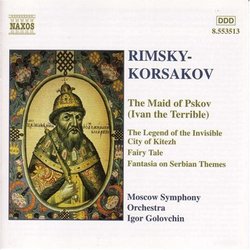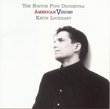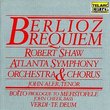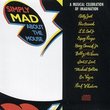| All Artists: Nikolai Rimsky-Korsakov, Igor Golovschin, Igor Golovchin, Moscow State Symphony Orchestra Title: Nikolay Rimsky-Korsakov: The Maid of Pskov; The Legend of the Invisible City of Kitezh; Fairy Tale Members Wishing: 1 Total Copies: 0 Label: Naxos Release Date: 2/20/2001 Genre: Classical Styles: Opera & Classical Vocal, Forms & Genres, Theatrical, Incidental & Program Music, Symphonies Number of Discs: 1 SwapaCD Credits: 1 UPC: 730099451321 |
Search - Nikolai Rimsky-Korsakov, Igor Golovschin, Igor Golovchin :: Nikolay Rimsky-Korsakov: The Maid of Pskov; The Legend of the Invisible City of Kitezh; Fairy Tale
CD DetailsSimilarly Requested CDs
|
CD ReviewsRimsky's Fairy-Tale Music Thomas F. Bertonneau | Oswego, NY United States | 03/26/2001 (4 out of 5 stars) "Nicolas Rimsky-Korsakov (1844-1908), the much-patronized composer of "Sheherazade" (1888) and of the "Capriccio Espagnol" (1887), poured most of his creative juices into opera. He wrote twelve operas, the first, "The Maid of Pskov," in 1868, and the last, "The Golden Cockerel," in 1908, the year of his death. (The première occurred posthumously in 1909.) The stage works contain Rimsky's best music and the suites that he derived from them outshine the works that he wrote strictly for the concert-hall. The mark of Rimsky's operatic achievement is that he had only one genuine successor in Russia - Sergei Prokofiev, of whose music-dramas only "War and Peace" measures up fully to the criteria established by his precursor. A romantic, Rimsky steeped his operatic scores in the lore, musical and narrative, of the Russian folk. Igor Golovchin, who, with the Moscow Symphony Orchestra, has recorded the orchestral works of Alexander Glazunov for Naxos, now enters a CD devoted to Rimsky, in a program including the suites from "The Maid of Pskov" (1868-72) and "The Legend of the Invisible City of Kitezh" (1907) and two other works, the early "Fantasia on Serbian Themes" (1867) and the once-popular "Skazka" ("Fairy-Tale" [1879]). Never forget that Rimsky wrote a treatise on orchestration: Of this subsidiary art, he was an exalted master. Part of the considerable delight in the two suites is the transparent brilliance of the sounds. Often, in the carefully constructed climaxes, the glockenspiel or triangle provides a highlight while trumpets opine over a magical tremolo in the strings; the woodwinds regularly bubble and coo and the percussion add to the pomp and splendor. The Stravinsky of "The Firebird" and of "Petrouchka" leaps like an Athena from the head of the Rimskyan Zeus. The alternative title of "The Maid of Pskov" is "Ivan the Great" (a.k.a. "the Terrible"): We hear the Overture and four entr'actes. The Overture features a fanfare on ceremonial horns - endearing and effective. The "Kitezh" music also comprises five movements, but it is more continuous in its impression, more symphonic (if you will), than "The Maid." With "The Golden Cockerel," "Kitezh" stands as the consummation of Rimsky's involvement with the legends of Old Russia. The opening "Hymn to Nature" recasts Wagner's "Forest Murmurs" in Slavic accent. The "Wedding Procession" makes use of an exotic eleven-beat rhythm that vexed early executors iof the score. Nicolas Slonimsky made up a rhyme to help the Boston Symphony "get it" back in the mid-1920s when he was Koussevitsky's assistant: "Rím-sky Kór-sak-óv is áb-so-lúte-ly mád, Rím-sky Kór-sak-óv is crá-zy ás a lóon." "The Battle of Kerzhenets" forecasts Prokofiev's music for the famous Eisenstein film. The Final "Death of [the Maiden] Fevroniya and the Apotheosis of the Invisible City" is at once glorious and sentimental. The Vox Box covering much of this material (and more) might still be available. The conductor there, I believe, is Richard Kapp, who does a good job. Golovchin and the Moscow Symphony offer a plenteous program in good sound. This is a good disc for getting kids to listen to serious music. The magic of the orchestrations will make them attend and all four scores have an understandable narrative context." Lifeless performances Russell | Melbourne, Australia | 06/28/2003 (2 out of 5 stars) "I brought this CD for the suite from "The invisible City of Kitezh". I heard the Chandos/Jarvi recording of this suite on the radio and was spellbound by it. However, I couldn't justify the expense of the Chandos performance, since this only comes as a full price 3 CD set. I therefore picked up the Naxos contender instead. However, right from the start, the invisble city of kitezh fails to excite, as the Jarvi performance does so well. The beautiful shimmering strings at the start in Jarvi's account are almost inaudible in the naxos version, and given that there's not much else going on at this point, the performance seems to fall flat from the start for my liking. Things don't pick up either, and I find the whole performance rather lifeless. However, Jarvi's account on chandos is absolutely spellbinding; It's just a pitty that it's not available as a single disk. I love Rimsky-Korsakov, but I find the rest of the CD rather boring. The suite from Ivan the terrible is pretty lifeless as well; Again, I've heard much better.While naxos are putting out some fantastic performances (ie: Bax, Moeran, Harty, Copland, Ives, Holst, etc) there is also a large amount of "ordinary" performances; My opinion is that this CD is one of them." Legend of the Invisible City Mary Holladay | Oakland, OR USA | 12/28/2007 (5 out of 5 stars) "I got this as a treat to myself and particularly enjoyed the "Wedding Processional". The sleigh bells make this piece particularly appropriate for these wntery months."
|


 Track Listings (11) - Disc #1
Track Listings (11) - Disc #1








